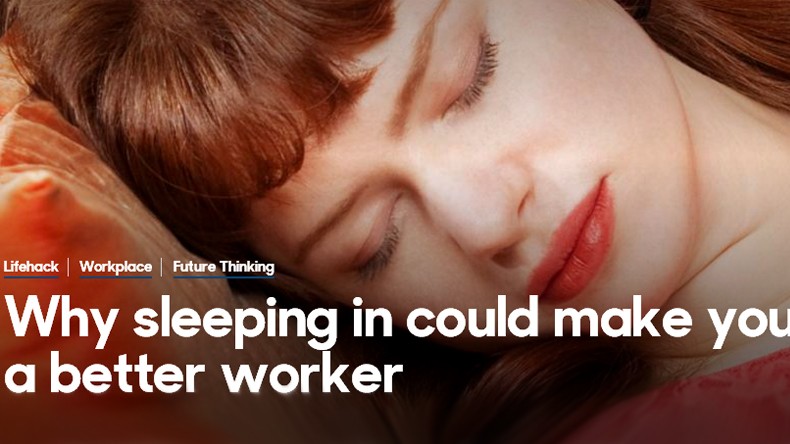
More than 70% of people get up earlier than they should, ideal work day should start at 10am, experts argue
A growing field of research shows that work schedules are wildly out of sync with natural body clocks of the people — and experts are urging employers to take notice, the BBC reports.
Sleep is a “strategic resource” that most companies are ignoring, according to a white paper by Christopher Barnes, a management professor at the University of Washington’s Foster School of Business in the US. When work schedules are aligned with people’s natural sleep patterns, they produce higher quality and more innovative work because they are more focused, less stressed and generally healthier, he wrote. The opposite is also true – when employees are sleep deprived they are more likely to make major mistakes and suffer from workplace injuries. His research has even shown that night owls behave more unethically in the morning than at night and that early birds were more unethical at night.
But it is not just about the amount of sleep you get. Whether you can be productive at 8am depends on circadian rhythm. Every organism from primitive bacteria to human beings have a biologically determined, internal body clock, said Till Roenneberg, a professor of chronobiology at the Institute of Medical Psychology at Ludwig-Maximilian University in Munich. And that clock can vary greatly depending the person.
According to Roenneberg the problem is that our lives typically do not take into account circadian rhythms as they might have when we spent more time outdoors in natural light. Many companies start the work day at 8am or 9am, putting their work schedules at odds with their employees’ body clock. That mismatch, along with the pressure to be productive and be available to respond to email or take calls at all hours of the day and night, mean that many people suffer from what he calls “social jetlag.” In other words, their bodies are always in the wrong time zone. He estimates that more than 70% of people get up earlier than they should if the goal is to be well rested and perform their best, the BBC writes.
The mismatch between people’s internal clocks and the schedule they have to follow to get on in life starts in adolescence, said Paul Kelley at the University of Oxford’s Sleep and Circadian Neuroscience Institute in the UK. Kelley told the BBC that most people’s body clocks start moving forward around puberty. By the time they reach high school or secondary school, teenagers are getting up, on average, three hours earlier than they should because of early school start times in some cases as early as 7:30am. The result: chronic sleep deprivation, that hurts their ability to focus and could lead to longer term health problems like obesity and diabetes, he said. Because of a major public health push, some school districts in the US and the UK are moving school start times later. As people age, their body clocks start to shift back to an earlier wake time, but Kelley said that most of the working population is still getting up too early. He believes that the ideal work day should start at 10am. It is not rational to start the work day at 8am, he said. Kelley argues, “circadian rhythms are controlled by biology, not by custom”.
Using his research on chronotypes (a term which describes whether a person is an early bird or a night owl), Roenneberg conducted experiments at a Volkswagen car plant and ThyssenKrup's European steel factory both in Germany. He adjusted worker shifts to match their body clocks, giving later risers afternoon and evening shifts and early risers morning shifts. In both cases, he found that workers who adjusted their work schedule to their individual biological clocks were more productive, healthier and less tired both at work and in their free time.
Ryan Olson, a scientist at the Oregon Institute of Occupational Health Sciences in the US, found the same true for office workers. “With technology today there is no reason to have a rigid schedule,” he told the BBC. “Sleep is a topic that companies want to hear about.”
Newsfeed
Videos






























